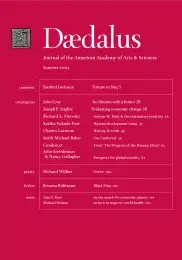Sketch for a Historical Picture of the Progress of the Human Mind: Tenth Epoch
Translator’s Note: There is still no definitive or critical edition of Condorcet’s “Esquisse d’un tableau historique des progrès de l’esprit humain,” or of the other parts of the work for which it was intended as an introduction. The text published posthumously in 1795 contains additions to the extant manuscript that were presumably made by the author before his death. The standard edition of Condorcet’s collected works, “Oeuvres de Condorcet” (edited by A. Condorcet O’Connor and M. F. Arago, 12 vols. [Paris: Firmin Didot frères, 1847–1849]), reprints the text of 1795 with many minor changes; it also includes substantial fragments from the larger work. I have followed the edition of the “Esquisse” by O. H. Prior (Paris: Boivin, 1933; republished with an introduction by Yvon Belavel [Paris: J. Vrin, 1970]), which uses the text as published by Arago and O’Connor, placing in square brackets passages from the 1795 edition that do not appear in the extant manuscript.
Several of the choices I have made as translator should be mentioned. In current English, the term ‘perfectibility’ and its close cognates seem to carry a stronger implication of absolute perfection than they do in eighteenth-century French. In most cases, I have found terms like ‘ameliorability,’ ‘amelioration,’ and ‘betterment’ closer to Condorcet’s intended meaning. The French term ‘facultés’ also presents a question: it can refer, as in English, to capabilities with which an individual is physically endowed (e.g., sight or operations of the mind) or to powers arising from their exercise. I have used ‘faculties’ for the former, ‘capacities’ for the latter. Finally, like most eighteenth-century writers, Condorcet generally uses the singular and plural forms of ‘homme’ to refer generically to human beings. Where possible without contortion, I have used gender-free language in translating these terms. Please also note that the section breaks that appear in this translation are my own.
I wish to express thanks to Emma Rothschild for helpful comments on a draft of this translation.
If we can predict phenomena with almost complete confidence when we know their laws, and if, even when we are ignorant of these laws, past experience allows us to anticipate future events with a great degree of probability, why should it seem an impossible undertaking to project the future destiny of the human species with some plausibility from the results of its history? The only basis for belief in the natural sciences is the idea that, whether we know them or not, the general laws governing the phenomena of the universe are necessary and constant. Why should this same principle be less true for the development of the intellectual and moral capacities of humankind than for other natural processes? In short, since judgments grounded on past experience of like events are the sole rule of conduct for the wisest individuals, why shouldn’t a philosopher be permitted to base his conjectures on this same foundation, provided he attributes to them a certainty no greater than can be sustained by the number, consistency, and precision of his observations?
Our hopes for the future condition of the human species can be reduced to three important points: the destruction of inequality among nations; the progress of equality within each people; and the real betterment of humankind. Will all nations necessarily approach one day the state of civilization achieved by those peoples who are most enlightened, freest, and most emancipated from prejudice, such as the French and the AngloAmericans? Will we necessarily see the gradual disappearance of that vast distance now separating these peoples from the servitude of nations subjected to kings, the barbarism of African tribes, the ignorance of savages?
Are there regions of the globe where the inhabitants have been condemned by their environment never to enjoy liberty, never to exercise their reason?
. . .
